|
|
|
Sort Order |
|
|
|
Items / Page
|
|
|
|
|
|
|
| Srl | Item |
| 1 |
ID:
192514
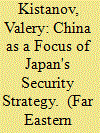

|
|
|
|
|
| Summary/Abstract |
This paper deals with Japan's current security policy toward China. Both countries have now become major trade and economic partners, but at the same time, their political ties have deteriorated significantly. Over the past decade, the degree of conflict in Japanese-Chinese relations has increased dramatically, despite consistent efforts by Tokyo and Beijing to improve bilateral ties through political and diplomatic measures. Japan is increasingly concerned about China's offensive naval activities in the East and South China Seas, which Tokyo regards as an area of vital interest. The most acute points of confrontation today are the situations around the Senkaku Islands and Taiwan, which could escalate into armed clashes. With the adoption of Tokyo's new National Security Strategy in December 2022, China has in effect been elevated to the main military threat to Japan. Under this strategy, Tokyo has embarked on a course of strengthening its military capabilities, paying particular attention to their offensive component. Moreover, in preparation for responding to the "Chinese threat," Japan is taking measures to qualitatively and quantitatively strengthen military cooperation with the US under a security treaty. The military alliance with the US will remain the cornerstone of Japan's security for the foreseeable future, including with the aim of deterring an increasingly powerful China.
|
|
|
|
|
|
|
|
|
|
|
|
|
|
|
|
| 2 |
ID:
192512
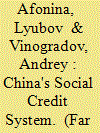

|
|
|
|
|
| Summary/Abstract |
China's nationwide social credit system (also called social rating system) aims to collect and analyze data on companies and individuals to assess their economic and social influence, civic qualities, responsibility, and financial reliability. The digital deterrence system for regulating public life appears to be a continuation of the Chinese social experiments of the second half of the 20th century. This time, however, social engineering uses previously unknown technical means free from the disadvantages of subjective evaluation and application under set parameters. Digitalization has thus provided another tool for assessing social behavior - an additional control system based on strict mathematical principles and, importantly, unlike legal systems, operating in real time. In terms of its regulatory function, it is comparable to ethnical norms and morality.
|
|
|
|
|
|
|
|
|
|
|
|
|
|
|
|
| 3 |
ID:
192518


|
|
|
|
|
| Summary/Abstract |
The author examines the role of Dobrovolny Flot (lit. "Volunteer Fleet," hereinafter Dobroflot or the Fleet) in the expansion of shipping traffic between the European and Far Eastern regions of Russia between 1891 and 1914. This paper presents the first ever comprehensive assessment of the effectiveness of this state-controlled shipping enterprise and contributes to the evaluation of commercial performance indicators of maritime freight and passenger transportation in the Russian Empire. An empirical analysis reveals a firm relationship between government support and the stability of coastal shipping operations. Additionally, the author finds that growth of the state-owned company's profitability came mainly from an increase in profits from the transportation of commercial cargoes. Using archival documents, corporate statistics, and records of State Duma debates, the author demonstrates that attempts to increase the volume and activity of interregional transportation led to major changes in the principles of government regulation, that the reform was inspired by the desire to support cargo transportation rather than passenger traffic, that the reform was characterized by cooperation between officials and business circles, and that legislative acts (of 1892, 1902, 1912, and 1914), although flawed in some respects, nevertheless provided a basis for future public-private partnership. This conforms to conclusions that the development of the transportation business was largely caused by growing income resulting from transformations in Russia's infrastructure sector, by the government's regional innovations, and by private interests related to cross-border commercial interaction. The author's findings support arguments that government support could accelerate transformations in the shipping business and contribute to the commercial orientation of the state-owned company's activities.
|
|
|
|
|
|
|
|
|
|
|
|
|
|
|
|
| 4 |
ID:
192517
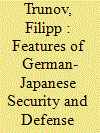

|
|
|
|
|
| Summary/Abstract |
Historically, both Germany and Japan have played significant roles in establishing a new world order. Today, the two countries are actively influencing the transformation of the "collective West" and its relations with the non-West. The role played in these processes by official Berlin, as well as by Tokyo, could considerably increase if they establish multi-channel and comprehensive security and defense cooperation. This paper seeks to explore the peculiarities and prospects of such cooperation in the early 2020s.
|
|
|
|
|
|
|
|
|
|
|
|
|
|
|
|
| 5 |
ID:
192516


|
|
|
|
|
| Summary/Abstract |
This paper is devoted to the political, legal, and state development of the People's Republic of China from 2018 to early 2023. Based on reports presented at the first session of the 14th National People's Congress (March 2023), we examine the main performance indicators of the State Council, the Standing Committee of the National People's Congress, the Supreme People's Court, and the Supreme People's Procuratorate. We also analyze the personnel lineup of the 14th National People's Congress. This paper presents the main resolutions passed by the National People's Congress and its Standing Committee from 2018 to 2023 in the constitutional, criminal, civil, and administrative fields. The authors predict the development of the PRC's legal system in the near future. The Standing Committee of the National People's Congress has passed several important laws, including the Law on Countering Foreign Sanctions and amendments to the current Criminal Code that lower the age of criminal responsibility to 12 years. The law-enforcement and judicial systems have demonstrated a high degree of effectiveness in combating conventional crime. Overall, amid the volatile international situation and rising tensions in the South China Sea and Taiwan Strait, the Chinese leadership has focused on improving the combat readiness of the armed forces, strengthening national defense, and ensuring national security, including through the adoption of appropriate legal acts.
|
|
|
|
|
|
|
|
|
|
|
|
|
|
|
|
| 6 |
ID:
192515
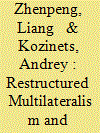

|
|
|
|
|
| Summary/Abstract |
Unlike the multilateral institutions of the past formed by hegemons in accordance with their interests, the multilateral format of the SCO (Shanghai Cooperation Organization) has given anew impetus to inclusive multilateral regional cooperation. In order to promote inclusive cooperation in Eurasia, the SCO member states have formulated strategic plans for cooperation in the main subregions and key areas of the organization's activities. New SCO plans to intensify cooperation consider the principle of inclusiveness and promote a system of compatibility of interests among members. Considering the relatively vague and "blurred" forms of cooperation existing among the member states, a quantitative increase in the SCO membership can both create new challenges and contribute to the emergence of new interaction formats. Thus, the introduction of new forms of "small multilateralism" may become relevant for enhancing the effectiveness of the SCO.
|
|
|
|
|
|
|
|
|
|
|
|
|
|
|
|
| 7 |
ID:
192511
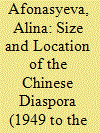

|
|
|
|
|
| Summary/Abstract |
This paper considers the following issues: the size of the Chinese diaspora (huaqiao-huaren - Chinese emigrants with PRC citizenship and ethnic Chinese with foreign citizenship), its location in the world, and its degree of self-organization. These issues are quite complex. There is still no generally accepted scientific methodology for exploring them. Changes in the size and geographical location of the Chinese diaspora in this paper are shown in a historical perspective, with a focus on 1949 (the year of establishment of the PRC), 1978 (the beginning of the policy of reform and opening up in the PRC), and 2000-2021 (recent period).
|
|
|
|
|
|
|
|
|
|
|
|
|
|
|
|
| 8 |
ID:
192513
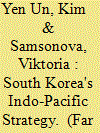

|
|
|
|
|
| Summary/Abstract |
The US Indo-Pacific Strategy, whose main principles were formulated in the US National Security Strategy released in December 2017, is aimed at preserving a unipolar structure of the world in an era of global changes that undermine US claims to world dominance. The more the authority of the unipolar world's overlord is undermined, the more diverse and dangerous the overlord's attempts become to preserve its dominant role by drawing into its orbit the countries that previously took a neutral stance toward the unilateralists' activity. This paper analyzes South Korean policy regarding the Indo-Pacific Strategy and examines the policy's political and economic aspects. The authors proceed from the view that South Korea, which has remained within the American global influence system for many decades, cannot ignore practically any American initiative. At the same time, the authors express doubt about the possibility of the transformation of the Indo-Pacific bloc being created under the auspices of the US into a significant international structure capable of altering the vector of the ongoing global changes. Moreover, the Indo-Pacific Initiative of the
|
|
|
|
|
|
|
|
|
|
|
|
|
|
|
|
|
|
|
|
|